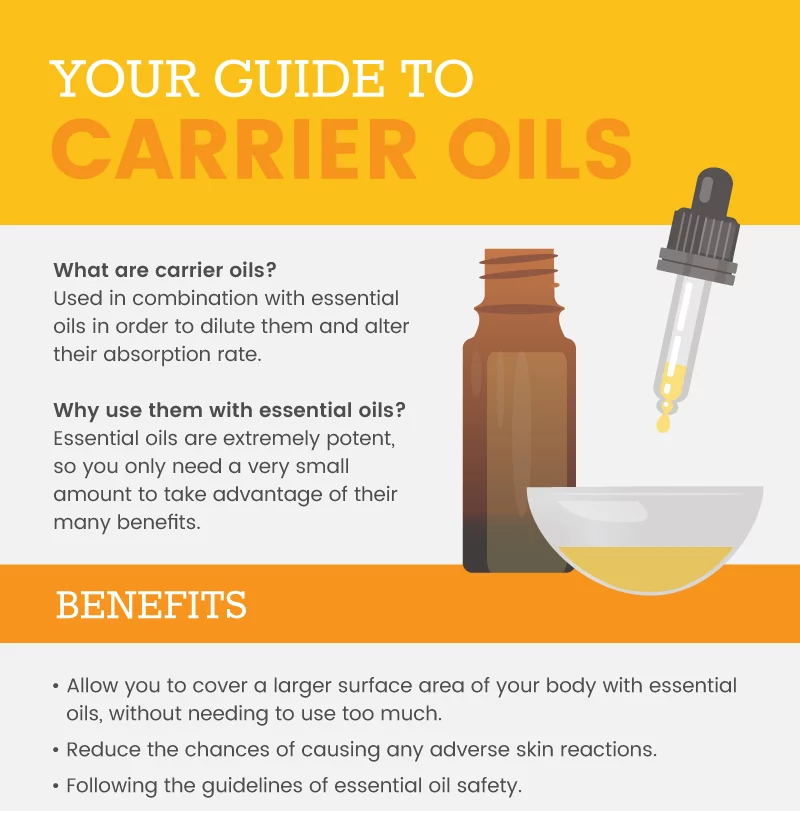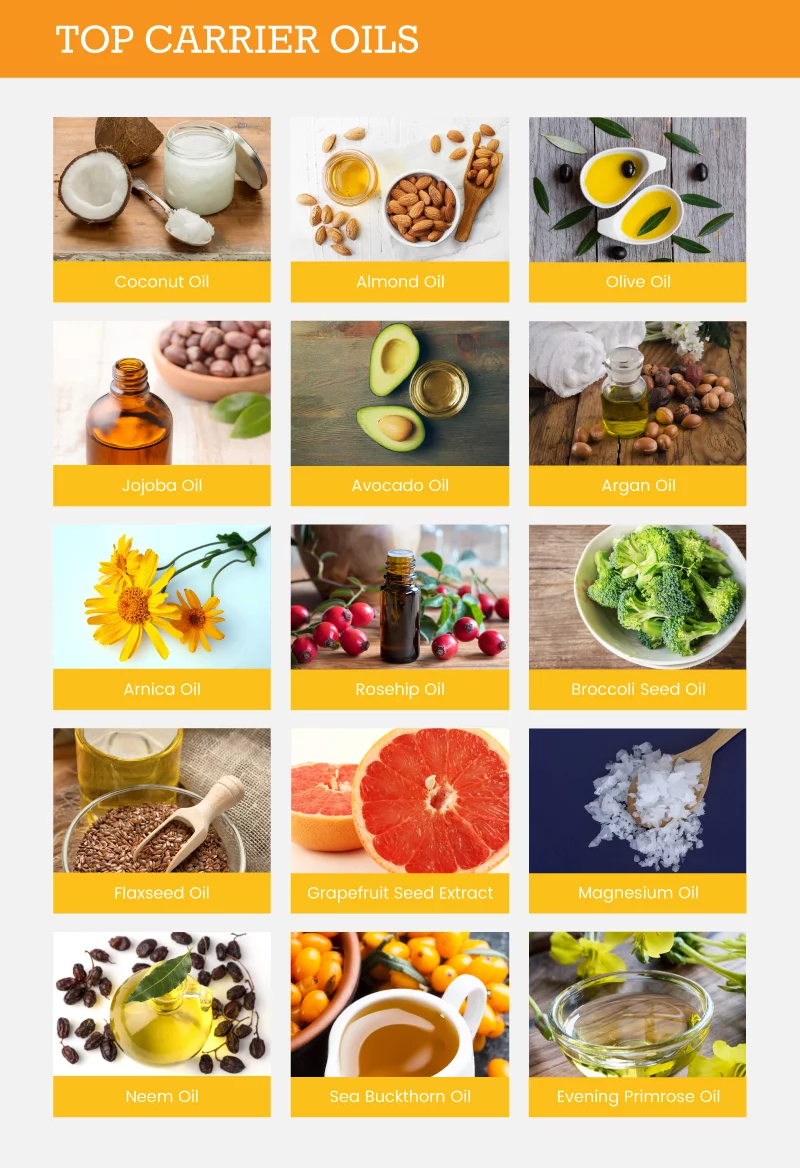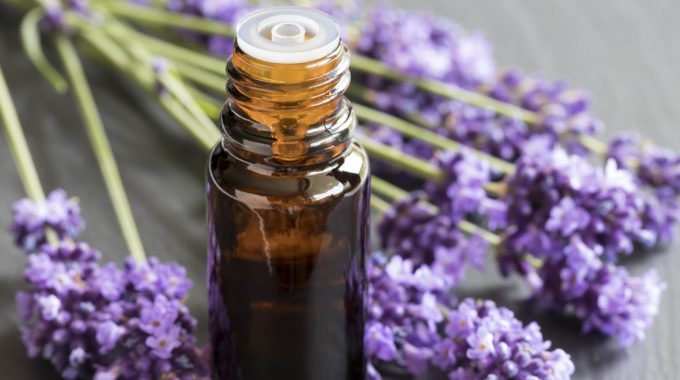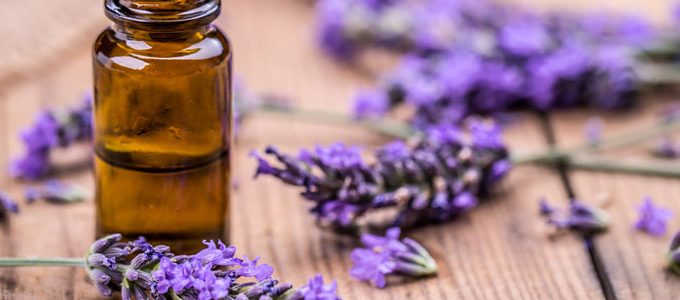
15 Carrier Oils for Essential Oils
You’ve probably been hearing a lot about essential oil uses and benefits lately. And in the descriptions of how essential oils can be used topically to fight infections and improve the health of your skin, it’s commonly recommended that you combine an essential oil with a carrier oil before applying it to your body. So your next question may be “what can I use as a carrier oil for essential oils?”
You actually have quite a few carrier oils to choose from, and you can make your pick based on your skin type, and your skin, hair and health concerns. Carrier oils allow you to use essential oils safely and effectively, but they also come with a ton of their own health benefits.
Most carrier oils are loaded with essential fatty acids, antioxidants, anti-inflammatory compounds and skin-healing vitamins. So if you’re still confused about what carrier oil to use as part of your essential oils routine, read through this list of carrier oils and their specific uses and benefits.
What Is a Carrier Oil?
Carrier oils are used in combination with essential oils in order to dilute them and alter their absorption rate. Essential oils are extremely potent, so you only need a very small amount to take advantage of their many benefits. Carrier oils allow you to cover a larger surface area of your body with essential oils, without needing to use too much. So when you use a carrier oil, you are reducing the chances of causing any adverse skin reactions and following the guidelines of essential oil safety.
Here’s an example of how carrier oils are used in combination with essential oils. If you want to use tea tree oil on your face to fight acne and improve your complexion, applying the recommended topical dose, which is about 1–3 drops, wouldn’t cover your chin, forehead, nose and neck. By combining 1–3 drops of tea tree oil with about half a teaspoon of any carrier oil, you can now apply the mixture to every area of concern on your face, and you didn’t need to add too much tea tree. Make sense?
Using carrier oils is especially important when you are applying essential oils to areas of sensitive skin, using them on children, or when you’re looking to cover a large area of your body with essential oils. I love combining carrier oils and essential oils to create body moisturizers, massage and sports rubs, facial cleansers and even skin toners. Usually, I combine 1–3 drops of essential oils with about half a teaspoon of carrier oil. You want to use at least equal parts carrier oil and essential oil.
Another important role of carrier oils is to prevent easy evaporation of essential oils. This is important because essential oils are made of very small particles that are absorbed into the skin quickly and easily. Ever notice that just a few minutes after applying lavender or peppermint oil to your skin and you barely smell it anymore? That’s because it’s been absorbed. But because carrier oils are made from the fatty portions of a plant and don’t evaporate as quickly, adding them to essential oils will help to slow down the absorption rate, allowing for a larger and longer impact. (2)
Top 15 Carrier Oils for Essential Oils
1. Coconut Oil
Coconut oil serves as an effective carrier oil because it has a low molecular weight, allowing it to penetrate your skin on a deeper level. It also contains saturated fats that help the skin to stay moisturized, while helping to provide a smooth and even skin tone. In addition to this, coconut oil has antiseptic and antimicrobial properties, so it’s the perfect carrier oil for relieving skin conditions like acne, eczema and cold sores.
A randomized double-blind controlled trial sought to determine the efficacy of virgin coconut oil in treating mild to moderate xerosis, a medical term that’s used to describe dry, rough, itchy and scaly skin. Thirty-four patients were randomized to apply either coconut oil or mineral oil on their legs twice a day for two weeks. Researchers found that coconut oil and mineral oil had comparable effects, and both were able to improve symptoms of xerosis without causing adverse reactions. (3)
As a carrier oil, coconut oil uses for skin are numerous. Combine 1–3 drops of any essential oil that’s safe for topical use with about half a teaspoon of coconut oil and rub the mixture into the area of concern. If you are using an essential oil internally, combine 1–2 drops with a half-teaspoon of coconut oil before ingestion.
2. Almond Oil
Sweet almond oil is commonly used as a carrier oil because it contains antioxidants and helps to keep your skin nice and soft. Historically, it was used in Ayurvedic and Traditional Chinese Medicine to treat skin conditions like eczema and psoriasis.
Almond oil is light and easily absorbed into your skin, so when it’s combined with antimicrobial essential oils, like tea tree or lavender, it can help to gently cleanse your skin by getting into your pores and follicles. That’s why I use it in my DIY shower gel recipe with orange essential oil. Almond oil also has emollient properties, so it may be able to improve your complexion and skin tone. Almond oil is also one of the best carrier oils to use in your reed diffuser because it’s light and will help to spread the scent of the essential oils you choose.
3. Jojoba Oil
Jojoba oil is an excellent carrier oil because it’s odorless and serves as an emollient, helping to soothe your skin and unclog pores and hair follicles. But beyond acting as a carrier oil, jojoba oil has many of its own benefits for your hair and skin.
Jojoba oil is actually a plant wax, not an oil, and it can be used to moisturize, protect and cleanse your skin, prevent razor burn, and promote the health of your hair. In fact, I use jojoba oil in my DIY moisturizer for oily skin because it helps to balance oil production in the skin, so it won’t leave you feeling greasy. Plus, jojoba oil contains vitamin E and B vitamins, which help to treat sunburns and wounds, it has antifungal and anti-inflammatory properties, and it contains three fatty acids.
4. Olive Oil
Olive oil is high in healthy fatty acids, anti-inflammatory compounds and antioxidants. Not only does consuming real extra virgin olive oil benefit your heart, brain and mood, but it can also be used as a carrier oil to help hydrate your skin, speed up wound healing and even help to fight infections.
Research suggests that olive oil may serve as a promising treatment for skin related conditions like seborrheic dermatitis, psoriasis, acne and atopic dermatitis. It helps to improve these skin issues by reducing inflammation and fighting the growth of bacteria.
5. Avocado Oil
Like so many carrier oils, avocado oil benefits your health when it’s consumed and used on your skin. It’s very moisturizing, so works best for people with dry, rough skin. Avocado oil helps to improve skin texture, remove makeup and hydrate your hair. Plus, research conducted on rats suggests that avocado oil may help to reduce inflammation and increase collagen production, making it a useful tool for treating skin wounds.
To use avocado oil alone, simply add a small amount to a cotton ball and apply it to dry areas on your face, cracked heels, dry cuticles and dry hair. To use it as a carrier oil, combine 1–3 drops of any essential oil that’s safe for topical use with about a half teaspoon of avocado oil and rub the mixture into any areas of concern.

6. Argan Oil
Argan oil is a one of the best carrier oils for your skin because it contains omega-6 fatty acids, linoleic acid, antioxidants, vitamins A and vitamin E. It’s often included in cosmetic products because when it’s used topically, trocopherol from the vitamin E promotes cell production, boosting the health of your skin and hair.
Argan oil absorbs quickly and it’s gentle enough to use on sensitive skin. It doesn’t leave you with greasy skin either. Like jojoba oil, argan oil helps to reduce sebum levels in people with oily skin, so it’s a great carrier oil for all skin types. Research suggests that argan oil is also helpful in improving skin elasticity and has anti-aging effects.
You can use argan oil alone to moisturize your skin, relieve razor burn, fight acne and improve your complexion, or you can combine it with essential oils to have an even deeper impact, like I do in my DIY face moisturizer that contains lemongrass, lavender and chamomile essential oils.
7. Arnica Oil
Arnica oil is so useful for so many skin and body issues, and it’s one of the best carrier oils for essential oils. It contains helenalin, which is a powerful anti-inflammatory compound, several fatty acids and thymol, which has shown in lab studies to display antibacterial activity.
Arnica oil can be used alone to reduce inflammation, improve muscle pain and heal bruises, or it can be used as a powerful carrier oil. I use arnica in my homemade bruise cream, and I combine it with soothing essential oils, like lavender, to relieve muscle pain and tension.
When you look at the ingredient label of arnica oil products, you’ll notice that it contains arnica extract and a base oil, like olive oil or almond oil, mixed with it. This is important because arnica is not meant to be used on the skin when it’s undiluted. Plus, you shouldn’t use arnica oil on open wounds or cuts, and it should be avoided by women who are pregnant or breastfeeding. If too much arnica gets inside of your body, through ingestion or broken skin, it can be toxic.
8. Rosehip Oil
Like many popular carrier oils, rosehip oil contains essential fatty acids that promote cellular and tissue regeneration. Rosehip is also high in vitamin C and has anti-aging effects when it’s applied to the skin. It’s often used to improve age spots from sun damage, improve skin tone and texture, reduce eczema symptoms and fight skin infections.
Rosehip oil is considered a dry oil, which means that it absorbs into the skin quickly and won’t leave you with an oily residue. For this reason, it works best for people with normal to dry skin. You can use rosehip oil alone as a natural moisturizer or combine it with essential oils as a carrier oil, like I did in my lavender and rose water toner.
9. Broccoli Seed Oil
Have you ever heard of using broccoli seed oil? It’s made by cold-pressing the small seeds of broccoli sprouts, which contain up to 80–100 times more of the antioxidant sulforaphane than the broccoli that you eat. It also contains omega 3, 6 and 9 fatty acids.
Broccoli seed oil works as an excellent moisturizer, but it’s still light, easily absorbed and non-greasy. It’s actually known to mimic silicone, which is commonly used in cosmetic and beauty products to make your skin look smoother and hair look shinier. Using broccoli seed oil as a carrier oil can promote healing, reduce dryness and improve the health of your hair.
10. Flaxseed Oil
Not only do flaxseed oil benefits include its ability to aid digestion and boost the health of your heart, but when it’s applied to the skin, flaxseed oil helps to relieve common skin disorders, like eczema, and improve skin elasticity and texture. It’s loaded with omega-3 fatty acids and alpha-linoleic acids (ALAs), which help to reduce inflammation and boost the health of your skin and hair.
Although you probably hear more about how flaxseed oil can be used in recipes, like smoothies and salads, it can also be used as a carrier oil and applied topically. In fact, it’s been used in Ayurvedic medicine to balance the skin’s pH, promote wound healing and remove skin blemishes. It’s gentle and soothing, so it may become your favorite carrier oil if you have sensitive skin. (13)
11. Grapefruit Seed Extract
Grapefruit seed extract is used for its antimicrobial properties, which have been displayed in laboratory studies. It’s often used in shower gels, wound disinfectant sprays, toothpastes, mouth washes and other personal care products because of its ability to fight bacterial, viral and fungal infections. You can also add grapefruit seed extract to your laundry, humidifier, swimming pool and animal feed to reduce the need for potentially harmful chemicals.
You can use grapefruit seed oil as a carrier oil in your natural home and body products. Use equal parts grapefruit seed extract and essential oil, and if you need to dilute the combination further, add water or another odorless carrier oil.
12. Magnesium Oil
Magnesium oil isn’t actually an oil, but a mixture of magnesium chloride flakes and water. It has the same texture as oil, which is why it works as a carrier oil. Using magnesium oil topically may help to relax your muscles, may help to improve fibromyalgia symptoms, can improve skin irritations, like rosacea and acne, and promote blood flow. It’s a great carrier oil for people with oily skin because it can help to break apart different fats and oils, preventing that greasy appearance you may be fighting.
You can mix magnesium oil with essential oils (like lavender) in a spray bottle and spray the combination on your skin after showering. You can also use magnesium oil as a carrier oil to create a muscle-relaxing massage oil or sports rub. Or try making my homemade magnesium body butter that can be applied to your skin to help relax your muscles and reduce the effects of stress on your body.
13. Neem Oil
Neem oil is commonly used in natural skin and beauty products because it’s high in antioxidants that work to protect the skin from environmental damage. Neem oil is also high in fatty acids and vitamin E, so it’s quickly absorbed into the outer layers of your skin and helps to relieve dry or damaged skin, without making you greasy. The healing properties in neem oil help to improve skin elasticity and rejuvenate the skin’s cells.
One thing that sets neem oil apart from other carrier oils is its ability to serve as a natural insecticide. It can be used to ward off mosquitoes, flies and moths. Neem oil can be mixed with essential oils, like lemon or eucalyptus, to work as a home remedy for mosquito bites. You can also combine neem oil with jojoba oil and lavender to create your own wrinkle cream that’s applied to your body like a moisturizer.
14. Sea Buckthorn Oil
Sea buckthorn oil may help to reduce skin issues like acne, dermatitis, eczema and stretch marks. It’s also commonly used to relieve sunburn and speed up wound healing. Sea buckthorn oil is loaded with healing antioxidants, including carotenoids, which means that it helps to protect the body from infections that are caused by viruses, bacteria and parasites. The oil also contains essential fatty acids, amino acids, and vitamins A, C, D and E.
Sea buckthorn oil can be combined with essential oils and used topically to improve skin irritations and complexion. I use it in my face moisturizer for dry skin because it’s an excellent carrier oil for repairing dry or damaged skin.
15. Evening Primrose Oil
Like most carrier oils, evening primrose oil is high in essential fatty acids and often used to improve skin irritations and conditions. Evening primrose oil also works as an anti-inflammatory agent, and it’s used to improve nerve function and skin elasticity. You can combine evening primrose oil with an antimicrobial essential oil, like tea tree oil, to improve acne and other skin conditions, to boost the overall health of your skin or to balance your hormone levels, like I did in my homemade hormone balance serum.
Although there aren’t any high quality studies to prove this benefit, evening primrose oil has been used to promote hair growth. To try this for yourself, simply rub evening primrose oil, combined with essential oils like lavender, cypress and lemongrass, into your scalp or add it to your shampoo.

Precautions
Just like you would when applying a new essential oil to your skin, I recommend doing a small skin patch test with any new carrier oil before applying it to a larger area of your body. Although most of these carrier oils are gentle enough even for areas of sensitive skin, you want to be sure that you don’t have an allergy or sensitivity to a new oil.
Most of the carrier oils discussed in this article can be found online or in your local health food store. Make sure to store your carrier oils in a dark glass jar that has a tight fitting top. Most carrier oils can be stored in the refrigerator or in a dark, cool place. Over time, carrier oils become rancid, which causes the oil to have a strong, bitter odor. If you notice that the scent of a carrier oil has changed over time, throw it out and buy a new one.
Final Thoughts
- Carrier oils are used in combination with essential oils in order to dilute them and alter their absorption rate.
- When combined with 1–3 drops of essential oils, carrier oils can cover a large surface of your skin and help to relieve skin issues like acne, eczema, dry skin, age spots and sun spots.
- Using carrier oils also slows down the absorption rate, so you’re increasing the impact of the essential oils.
- The best carrier oils for essential oils include:
- Coconut oil
- Almond oil
- Jojoba oil
- Olive oil
- Avocado oil
- Argan oil
- Arnica oil
- Rosehip oil
- Broccoli seed oil
- Flaxseed oil
- Grapefruit seed extract
- Magnesium oil
- Neem oil
- Sea buckthorn oil
- Evening primrose oil



